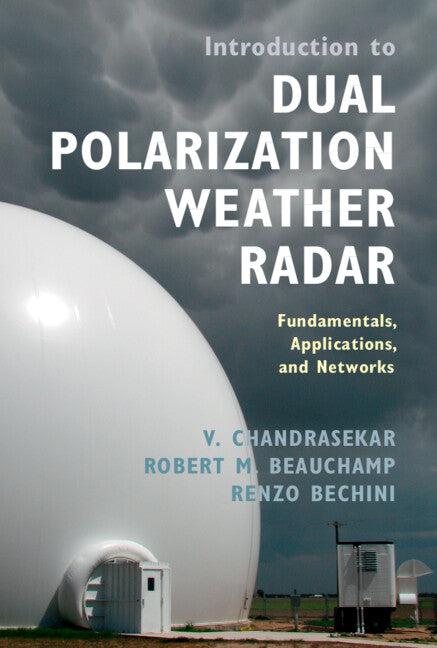Freshly Printed - allow 8 days lead
Couldn't load pickup availability
Introduction to Dual Polarization Weather Radar
Fundamentals, Applications, and Networks
An interdisciplinary, easy-to-understand introduction, covering fundamental theory and practical applications.
V. Chandrasekar (Author), Robert M. Beauchamp (Author), Renzo Bechini (Author)
9781108423175, Cambridge University Press
Hardback, published 17 August 2023
400 pages
28 x 19 x 2.6 cm, 1.128 kg
An interdisciplinary and easy-to-understand introduction to the subject, covering fundamental theory and practical applications, and using numerous operational examples. This balanced text will allow you to begin from what the radar observes and move deeper through electromagnetic scattering theory and cloud microphysics to understand and interpret data as it appears on the display. It uses illustrations and figures of real radar observations to convey concepts and theory of atmospheric processes typically observed with weather radar, as well presenting a working knowledge of the radar system itself. In addition to covering fundamentals of scattering and atmospheric physics, topics include system hardware, signal processing, and radar networks. This is the perfect tool for scientists and engineers working on weather radars or using radars and their data, as well as senior undergraduate and graduate students studying weather radars.
1. Introduction
2. Elements of dual-polarization radar systems
3. Essential precipitation physics for dual-polarization radar
4. Basic scattering theory and principles for radar meteorology. 5. Introduction to weather radar signals
6. Weather radar signal processing
7. Data quality, data science, and engineering of weather radars
8. Rate observations and classification
9. Rainfall estimation and attenuation correction
10. Weather radar networks.
Subject Areas: Weather [WNWM], Meteorology & climatology [RBP], Atmospheric physics [PHVJ], Electricity, electromagnetism & magnetism [PHK]


